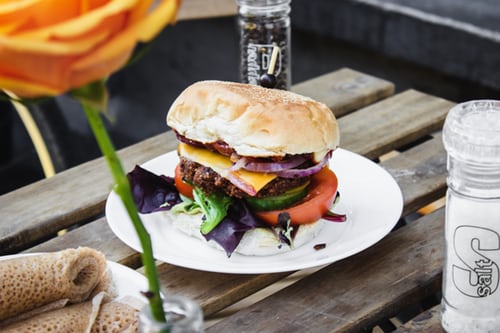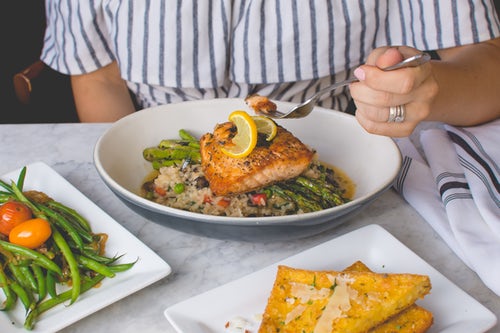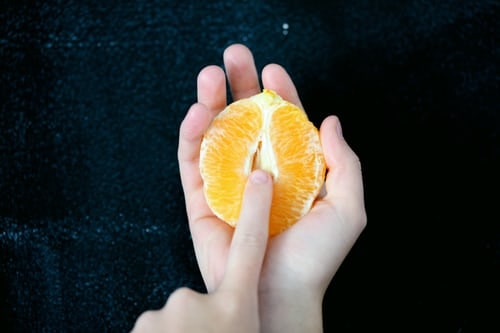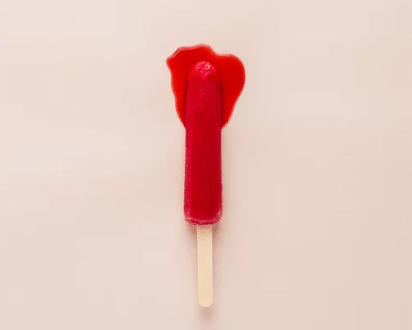I vividly remember the moment I finished reading the instructions on my first ever box of tampons. “I have to do what!?”
I was 13 years old. It was the morning of a school swimming carnival and I sat there in disbelief. I’d successfully executed the first few steps of the instructions (aka twisting off the plastic wrapping which let me tell you was confusing enough!) I now had this thing clasped in my hand and the rest of the instructions were incomprehensible.
I actually remember putting it back in that colourful box, closing the lid and going out of the change room perhaps a part of me hoping someone, anyone would know what was happening and come by and tell me it was all a joke. Needless to say, no one did, it wasn’t a joke and if I wanted to compete, I had to go back in there and trust those little words on that little piece of paper. So, bravely I did and in case you were wondering I won age champion.
It was not much more than a year later that I got sick with anorexia nervosa. A disease that entirely consumed my introductory years to womanhood and ensured my period was a very infrequent occurrence if ever which meant I never truly got a chance to develop a relationship with it.
Perhaps it is for this reason that lately this phenomenon has fascinated me because for the first time in my life I know it’s here to stay and as much as I’d like to say I am happily celebrating the return of my regular, healthy period I’m not.
Some months I get stupidly painful cramps and when I am floating around on my surfboard or diving, I always wonder if I am at higher risk of being eaten by a shark but mostly the influences this cycle has over my mood felt really unfair. So, at 29 I decided it was probably time I learnt what was happening and how I could make peace with it.
As a dietitian I was naturally most interested in what I could eat to support my happiness and vitality though my period and to be upfront with you the majority of the information I found was not useful and I’d go so far as to say there was some downright wrong and harmful nutrition advice getting around (which I sincerely hope no one follows). It was this discovery which inspired to write this post for you.
I hope I’ve made it clear by now that I am by no means an expert on the entire topic of menstrual cycles given my strange journey with my own but where I do have a good grasp is nutrition and I’d truly like to share a little from my area of expertise with you. I want to put some legitimate but most of all useful information out there so it’s available to any woman wanting to learn real life ways you can eat which may support your happiness and vitality during your period whether it be your first time learning how to use a tampon or maybe drawing closer to one of your final.
I’ve condensed what I’ve learnt into 3 simple but potentially high impact nutrition suggestions for how you can make a few adjustments to what and how you’re eating to optimise your happiness and vitality during your period. So, if this has ever been something you are interested in, consider having a skim over the rest of this post or taking diligent notes. It may just change your life, in any case it’s the pest period-nutrition information you’ll find out there.
- Eat Foods Which Give You Energy

During my very short lived Goolge of “nutrition to support your period health” (or other word combinations to that effect… what does one type in to find information in this area?…) there was a disconcerting dominant theme and that was this strange advice to eat leafy greens and beside from that every other message appeared to be focussed on what you should not eat.
I’m just going to cut to the chase with this one leafy green vegetables are not a cure all for the physical nor the mental symptoms of PMS.
First and foremost, your body wants energy and for good reason because menstruation takes a fair bit of energy and nutrients after all it is the entire inner lining of your uterus getting shed and rebuilt each month!
There isn’t a whole lot of energy in leafy greens. So, by all means include them if you love them but please know they’re not a magical PMS cure and if you’re low on energy, feel irritable or moody the leafy greens aren’t going to help too much with that.
Nutrient and energy rich foods aka foods containing the three macronutrients namely fats (for example avocado, nuts, butter, seeds and olive oil), protein (for example fish, nuts, eggs and legumes) and carbs (for example bread, pasta, rice, oats and potato) on the other hand will. It is these more higher energy containing foods which should realistically always be the mainstay of any healthful diet at least of any person wanting to lead a productive and engaged life.
It doesn’t matter how much lettuce you eat or how many supplements you take if you’re not meeting your body’s need for energy your period isn’t going to be a fun time because your daily life isn’t going to be a fun time.
Moral of the story: Be kind to yourself and eat foods which fuel you and at least give yourself a running chance to generate all the happiness hormones. If you want more info on the macros and great sources of each see my earlier blog on “What Is Healthy Eating Anyway?” or for how what we eat helps or hinders our happiness hormones “Mood and Food: How to Eat for Happiness”. The green leaves are filled with vitamins, minerals, fibre, antioxidants and all sorts of goodies so go full steam ahead on them but please know alone they’re not going to energise you.
2. Choose Foods Containing Iron and Omega 3 Fats

Ok so this point is kind of a two for one deal and even at that it’s really simplifying all the nutrients which would be ideal for you to eat and which would potentially improve any moodiness or PMS symptoms but if I had to give just two specific nutrients for you to pay attention to during your period I’d go with iron and omega 3 fatty acids.
Iron
When you are losing blood, you are losing iron (iron is the central atom of the haemoglobin molecule found within all your red blood cells- actually it is iron which gives your red blood cells their colour!).
Iron deficiency anaemia is fairly common in women and some signs to look out for which may indicate you’re low in iron are if you are feeling lethargic or more tired than usual, irritable, dizzy, notice your skin or gums look pale, have cold hands and feet, heart palpations or your heart is beating unusually fast at rest.
If you have any of these symptoms and are wondering if you may be iron deficient, go and ask for a blood test from your local GP because the good news is that all these symptoms are reversible when your iron stores are replenished (which if you do find you are deficient is usually through taking oral supplements).
If you’re interested in upping some iron rich foods here’s a few you can choose from:
- Organ meats
- Red meat
- Duck, chicken
- Fish
- Eggs
- Spinach, broccoli
- Nuts and seeds
- Dried apricots and raisins
*Note. Not all iron is created equally and if you’re getting your iron from plant sources it’s not as readily absorbed by your body and it’s a good idea to include a vitamin C rich food with your plant iron containing meal to increase your body’s uptake (for more information on how this works see my earlier blog “Nutrient Pairing: How to Get The Most From Your Food”)
Omega 3
There is a lot of research into omega 3 fatty acids brain health and mood regulation and diets rich in omega 3 fatty acids may reduce the mental symptoms sometimes experienced as part of PMS including anxiety, irritability, depression, nervousness and lack of concentration.
If you find you’re regularly experiencing any of these when it’s coming up towards your period or during your period, some good food sources of omega 3 fats to consider upping include:
- Fatty fish such as salmon and mackerel
- Nuts and seeds (especially flaxseed and walnuts)
Your symptoms may not be due to an omega 3 deficiency, but they also may be and imagine if you just included a little more fish in your diet or an extra handful of walnuts a day and felt a whole lot clearer and happier!? That’s life changing.
3. Have A Craving? Eat What You’re Craving

My final deep and meaningful pearl of wisdom is if there’s something you want to eat, eat it.
This is simple but we’re not very often (ever?) just told outright to do this. Being a dietitian, that is someone who has worked with hundreds if not thousands of people to help them improve their brain health and life enjoyment through nutrition this is legitimately the single most useful piece of advice I can give. It will change your life should you choose to take it and taking it means going against unrelenting societal messages to avoid and restrict and not trust your body.
One of the strangest and if you think about it most disrespectful things you can do to your body is this weird thing of trying to “trick” it into being satisfied eating x when really, it’s asking for y.
As I mentioned earlier during my brief randevu with Google and period-nutrition the two things I found were eat green leafy vegetables and cut out (cut out, cut out, cut out!) Top of the cut out was cut out everything you’re craving. Fight those cravings girl! (aka disrespect the infinite wisdom of your body, mind and soul hmmmmmmm sounds like a bad idea to me…)
Fighting is not a word that should even figure in your vocabulary of how you treat your body. It’s your body. Girl, you wanna eat the damn chocolate eat the damn chocolate. Eat the chocolate and move on or don’t eat the chocolate and move on but don’t’ fight with yourself to not eat the chocolate. You’re an adult woman and as an adult woman guess who gets to make your food choices? You.
The only way to “fight” cravings is to eat enough nutritious foods so that your body trusts it is going to be fed when it wants to be fed (with what it wants to get fed with).
If you have intense cravings for rich foods, you may not be fuelling your body with as much energy as it wants spread across the day. Are you eating breakfast, lunch, dinner and snacks in-between? The first way to “fight” cravings is to do that. If you still are craving something eat it. If you think it’s emotional eating eat it still. If you’re really worried and it’s causing you distress or interrupting your life, consider putting the self-imposed shame and the whole “event” of it aside and seeing a non-diet dietitian. Get it sorted and move on with your life.
Don’t try to do this weird thing of “tricking” your body with a handful of almonds when you want chocolate or an apple when you want peanut butter because guess what? There is no “tricking” your body because your body is you!
Guess who was around when you ate those almonds or that apple but really wanted the chocolate or the peanut butter you, you and your body.
Your body knows it didn’t get the chocolate (insert x, y or z food here) and it’s just hoping it will get it later and it won’t give up until it does. Your body is intelligent, and I mean it is more intelligent than any of those “swap this for that” intricate lists trying to analyse each and every deeper meaning behind your craving. If it wanted the magnesium in chocolate and it was as easy as swapping it for the magnesium in almonds believe me your body would just ask for the almonds in the first place. Craving chocolate (or anything else) does not mean you need more magnesium (or vitamin/mineral a, b or c) it means eating some chocolate would be nice right now. For whatever reason your body is asking for chocolate just give it the chocolate. Your body is infinite wisdom.
Take Home Gems

If you experience any level of PMS including physical or mental symptoms such as anxiety, depression, irritability or inability to focus there are three top nutrition tips I’d suggest you give a try before anything else because what you eat has a profound (and often underappreciated) impact on your mood and vitality. These suggestions may not cure all but they also may (and in any case they have a higher chance than anything else I’ve read around this topic).
1. First and foremost make sure you’re eating enough energy (foods containing the macros – carbs, fats and protein). Your brain can only be happy if it’s getting the energy it needs (which is quite a lot with a whopping 20-25% of the calories you eat in a day going straight to your head).
2. If you’re going to focus on any specific nutrients in foods I’d suggest choosing foods which are good sources of iron and omega 3 fats (examples include red meat, spinach, nuts and seeds, olive oil and fatty fish like salmon). When your iron levels are low you will feel extra tired and unfocused and when you are low in omega you can feel sad or depressed and unmotivated. At the end of the day no amount of “therapy” or positive thinking can make up for a nutritional imbalance so if you have concerns see your GP or a dietitian for some blood work and dietary assessment to turn things around.
3. If there’s something you want to eat, eat it. Respect your body and don’t pretend that you need to in any way trick it into eating what’s “healthy” if you are eating to your body’s needs and meeting your energy and nutrient requirements there is no reason you cannot include those things which all the other blogs will tell you to cut out (cut out, cut out, out! *to be read in a frantic and increasingly shrill tone). You still want to live your life and if you’re like me you’ve got many more years of period fun ahead so don’t make it some weird mind game hell it doesn’t need to be. When you have a great relationship with your body and food there truly is no reason to feel there’s anything you cannot eat. If you feel there is this is the best place to start and get sorted first because nutritional education has a place and has use but if you don’t have a good relationship with yourself and food, it’s use is very limited.
Most of all I want to encourage you to be kind to yourself because if there’s anything I’ve learnt in my short time of period appreciation it is that it is quite demanding! Getting a period is a big deal and it’s a lot of work for your body and it’s easy to overlook that because it’s “normal” however normal doesn’t mean it’s not absolutely incredible what your body is doing. Love that, respect that and honour that. Girl, you are pure magic.
With All of My Heart I Trust You Found This Information Useful and Insiring.

Become Great. Live Great.
Bonnie.




2 thoughts on “3 DIY Nutrition Tips for Happiness and Energy During Your Period”
Hello there, just became alert to your blog through Google, and found that it’s really informative.
I’m gonna watch out for brussels. I’ll appreciate if you continue this in future.
Lots of people will be benefited from your writing. Cheers!
Thank you for your encouragement and I am happy to know you found my blogs useful.